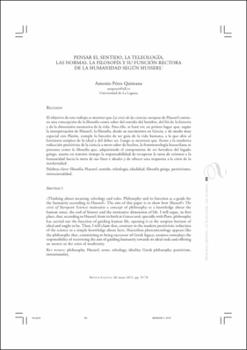Pensar el sentido, la teleología, las normas. La filosofía y su función rectora de la humanidad según Husserl
Author
Pérez Quintana, AntonioDate
2011Abstract
El objetivo de este trabajo es mostrar que La crisis de las ciencias europeas de Husserl contiene una concepción de la filosofía como saber del sentido del hombre, del fin de la historia y de la dimensión normativa de la vida. Para ello, se hará ver, en primer lugar, que, según la interpretación de Husserl, la filosofía, desde su nacimiento en Grecia, y de modo muy especial con Platón, cumple la función de ser guía de la vida humana, a la que abre al horizonte utópico de lo ideal y del deber ser. Luego se mostrará que, frente a la moderna reducción positivista de la ciencia a mero saber de hechos, la fenomenología husserliana se
presenta como la filosofía que, adquiriendo el compromiso de ser heredera del legado griego, asume en nuestro tiempo la responsabilidad de recuperar la tarea de orientar a la humanidad hacia la meta de sus fines e ideales y de ofrecer una respuesta a la crisis de la modernidad «Thinking about meaning, teleology and rules. Philosophy and its function as a guide for
the humanity according to Husserl». The aim of this paper is to show how Husserl’s The
crisis of European Sciences maintains a concept of philosophy as a knowledge about the
human sense, the end of history and the normative dimension of life. I will argue, in first
place, that, according to Husserl, from its birth in Greece and, specially with Plato, philosophy
has carried out the function of guiding human life, opening it to the utopian horizon of
ideal and ought to be. Then, I will claim that, contrary to the modern positivistic reduction
of the science to a simple knowledge about facts, Husserlian phenomenology appears like
the philosophy that, committing to being successor of Greek legacy, assumes nowadays the
responsibility of recovering the aim of guiding humanity towards its ideal ends and offering
an answer to the crisis of modernity





